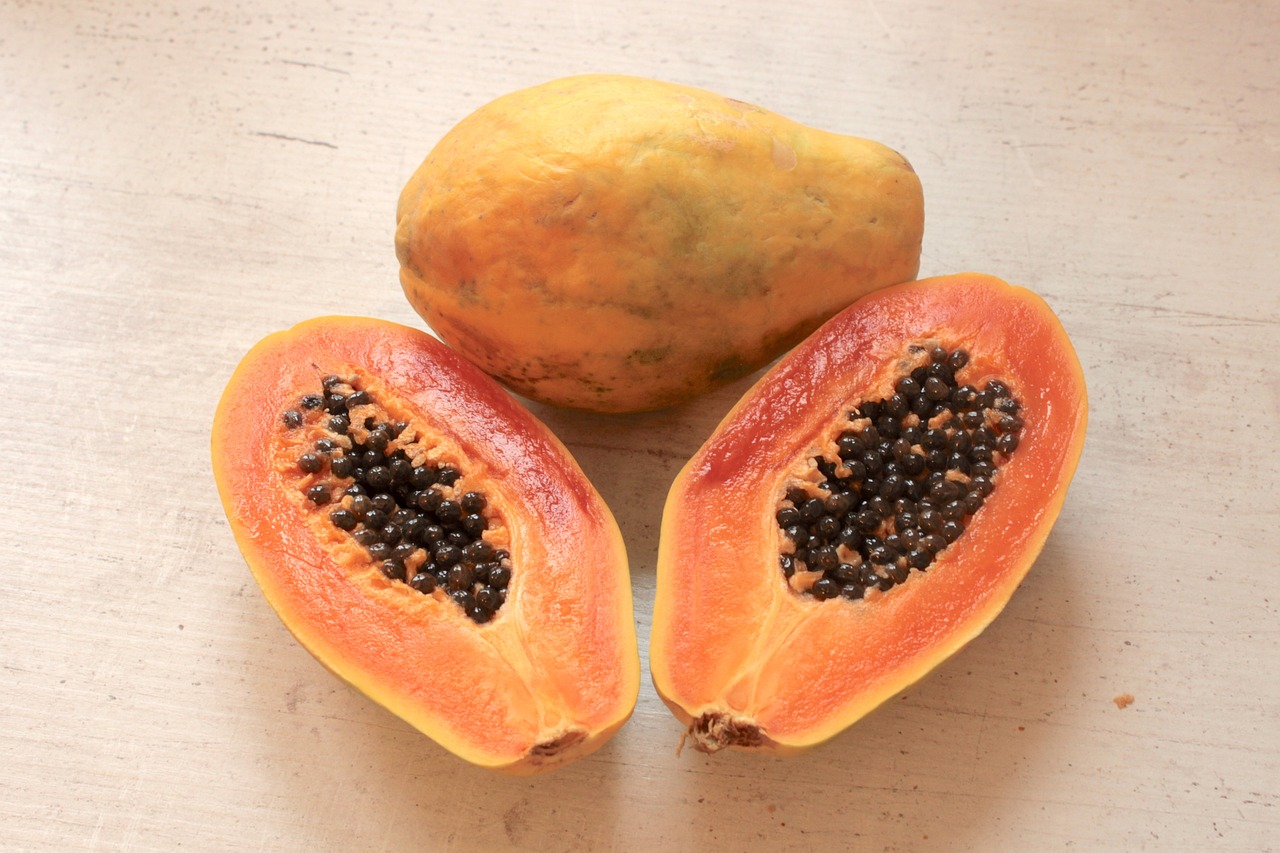
Papaya, a tropical fruit from Central America and Southern Mexico, is known as the “fruit of angels” due to its sweet flavor, bright color, and high nutrient content. It is now cultivated globally in tropical areas, valued for its culinary uses and health benefits. Beyond its taste, papaya is rich in nutrients and offers various health advantages, including aiding digestion and boosting the immune system. Traditionally, its fruit, seeds, and leaves have been utilized in medicine, highlighting its health-promoting properties. The article discusses papaya’s nutritional aspects, health significance, its use in traditional medicine, and ways to add it to daily meals.
Nutritional profile: Papaya is a low-calorie fruit, containing about 120 kcal per medium-sized fruit (300 grams). It has approximately 30 grams of carbohydrates, 5 grams of dietary fiber, 2 grams of protein, and less than 1 gram of fat. Papaya is particularly rich in vitamin C, providing over 200% of the recommended daily intake, and also contains 33% of the RDI for vitamin A, 14% for folate, and 11% for potassium. Additionally, it offers small amounts of calcium, magnesium, and various other vitamins and minerals. Notable compounds include beta-carotene, which is related to vitamin A, and papain, an enzyme that aids digestion.
Health importance:
- Digestive health- Papaya contains the enzyme papain, essential for protein breakdown and digestion, making it beneficial for those with indigestion, bloating, or constipation. It helps convert proteins into peptides and amino acids, facilitating the digestion of protein-rich meals. Additionally, papaya is high in dietary fiber, which supports healthy bowel movements, prevents constipation, and may lower the risk of colon cancer by aiding toxin elimination.In addition to papain, papaya also includes chymopapain, which assists in protein metabolism, serving individuals with pancreatic insufficiency. The presence of these enzymes makes papaya a natural remedy for digestive disorders like irritable bowel syndrome, acid reflux, and stomach ulcers, as they help soothe the digestive tract and reduce inflammation.
- Powerhouse of antioxidants- Papaya is rich in antioxidants that combat free radicals and lower oxidative stress, which can lead to chronic diseases like cancer, heart disease, and diabetes. Key antioxidants in papaya include vitamin C, beta-carotene, lycopene, and flavonoids. Lycopene, in particular, has been studied for its ability to lower cancer risk, especially for prostate, breast, and cervical cancers, by neutralizing free radicals and reducing DNA damage. Additionally, beta-carotene contributes to eye health as it is a precursor to vitamin A, which protects vision and may help prevent age-related macular degeneration. Regularly consuming papaya can enhance overall health and support long-term well-being.
- Skin health- Papaya is beneficial for skin health both when eaten and used topically. Its high levels of vitamins C and E and beta-carotene promote collagen production, which helps maintain skin elasticity and a youthful appearance. The papain enzyme in papaya acts as a natural exfoliant, removing dead skin cells and lessening fine lines and wrinkles, making it popular in skincare products. Additionally, mashed papaya can soothe sunburns, reduce inflammation, and aid in healing minor cuts and wounds, thanks to its anti-inflammatory properties that are effective against conditions like eczema and psoriasis.
Traditional medicine: The entire papaya plant, including its fruit, seeds, and leaves, is recognized for its medicinal benefits. Papaya seeds are noted for their potential to eliminate intestinal parasites due to a compound called benzyl isothiocyanate, traditionally consumed as a ground paste. Additionally, papaya leaves are believed to aid in the treatment of dengue fever by improving platelet counts and enhancing recovery, a remedy popular among those in tropical areas affected by the disease.
Ways to add it to your diet: Papaya is a versatile fruit that can be enjoyed in many ways. It can be eaten as slices with lime juice as a snack or dessert. Blending papaya with tropical fruits such as bananas or mangoes creates a nutritious smoothie, which can be enhanced with yogurt or plant-based milk. Papaya complements both sweet and savory dishes, making it suitable for fruit salads or green salads. It can also be used in salsas or chutneys, combined with tomatoes, onions, and spices. Fresh papaya juice is a popular drink, enjoyed alone or mixed with other juices like orange or pineapple for a refreshing option.
Precautions: Papaya is generally safe for most individuals, but there are some precautions to consider. Allergies may occur, especially in those with a latex allergy, potentially causing symptoms like itching or difficulty breathing. Pregnant women should avoid unripe papaya due to its high levels of papain and latex, which can stimulate contractions and risk miscarriage, while fully ripened papaya can be consumed in moderation. Additionally, papaya may interact with certain medications, particularly blood thinners like warfarin or aspirin, due to its high vitamin K content, so it is advisable to consult a healthcare provider before consuming large amounts.
-Triparna







